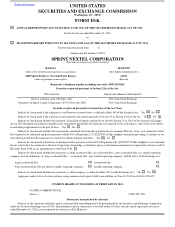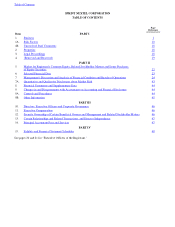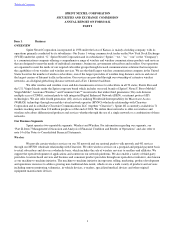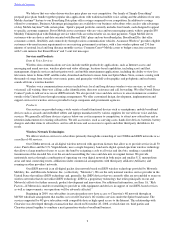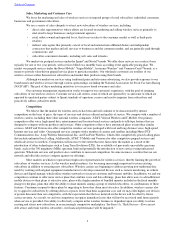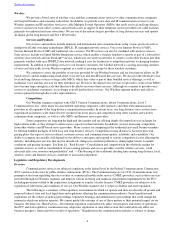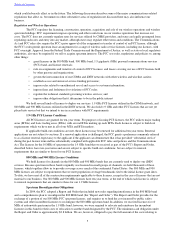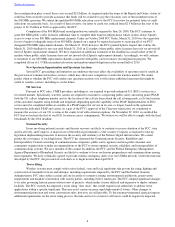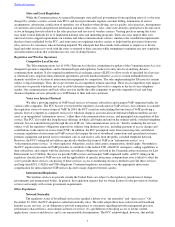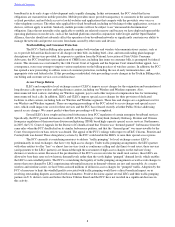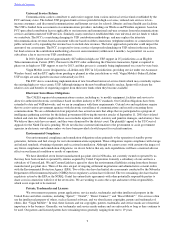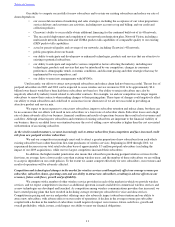Sprint - Nextel 2010 Annual Report Download - page 9
Download and view the complete annual report
Please find page 9 of the 2010 Sprint - Nextel annual report below. You can navigate through the pages in the report by either clicking on the pages listed below, or by using the keyword search tool below to find specific information within the annual report.
State and Local Regulation
While the Communications Act generally preempts state and local governments from regulating entry of, or the rates
charged by, wireless carriers, certain state PUCs and local governments regulate customer billing, termination of service
arrangements, advertising, certification of operation, use of handsets when driving, service quality, sales practices, management
of customer call records and protected information and many other areas. Also, some state attorneys general have become more
active in bringing lawsuits related to the sales practices and services of wireless carriers. Varying practices among the states
may make it more difficult for us to implement national sales and marketing programs. States also may impose their own
universal service support requirements on wireless and other communications carriers, similar to the contribution requirements
that have been established by the FCC, and some states are requiring wireless carriers to help fund the provision of intrastate
relay services for consumers who are hearing impaired. We anticipate that these trends will continue to require us to devote
legal and other resources to work with the states to respond to their concerns while attempting to minimize any new regulation
and enforcement actions that could increase our costs of doing business.
Regulation and Wireline Operations
Competitive Local Service
The Telecommunications Act of 1996 (Telecom Act) the first comprehensive update of the Communications Act, was
designed to promote competition, and it eliminated legal and regulatory barriers for entry into local and long distance
communications markets. It also required incumbent local exchange carriers (ILECs) to allow resale of specified local services
at wholesale rates, negotiate interconnection agreements, provide nondiscriminatory access to certain unbundled network
elements and allow co-location of interconnection equipment by competitors. The rules implementing the Telecom Act remain
subject to legal challenges. Thus, the scope of future local competition remains uncertain. These local competition rules impact
us because we provide wholesale services to cable television companies that wish to compete in the local voice telephony
market. Our communications and back-office services enable the cable companies to provide competitive local and long
distance telephone services primarily in a VoIP format to their end-user customers.
Voice over Internet Protocol
We offer a growing number of VoIP-based services to business subscribers and transport VoIP-originated traffic for
various cable companies. The FCC has not yet resolved the regulatory classification of VoIP services, but continues to consider
the regulatory status of various forms of VoIP. In 2004, the FCC issued an order finding that one form of VoIP, involving a
specific form of computer-to-computer services for which no charge is assessed and conventional telephone numbers are not
used, is an unregulated “information service,” rather than a telecommunications service, and preempted state regulation of this
service. The FCC also ruled that long distance offerings in which calls begin and end on the ordinary public switched telephone
network, but are transmitted in part through the use of IP, are “telecommunications services,” thereby rendering the services
subject to all the regulatory obligations imposed on ordinary long distance services, including payment of access charges and
contributions to the universal service fund (USF). In addition, the FCC preempted states from exercising entry and related
economic regulation of interconnected VoIP services that require the use of broadband connections and specialized customer
premises equipment and permit users to terminate calls to and receive calls from the public switched telephone network.
However, the FCC's ruling did not address specifically whether this form of VoIP is an “information service” or a
“telecommunications service,” or what regulatory obligations, such as intercarrier compensation, should apply. Nevertheless,
the FCC requires interconnected VoIP providers to contribute to the federal USF, offer E911 emergency calling capabilities to
their subscribers, and comply with the electronic surveillance obligations set forth in the Communications Assistance for Law
Enforcement Act (CALEA). Because we provide VoIP services and transport VoIP-originated traffic, an FCC ruling on the
regulatory classification of VoIP services and the applicability of specific intercarrier compensation rates is likely to affect the
cost to provide these services; our pricing of these services; access to numbering resources needed to provide these services;
and long-term E911, CALEA and USF obligations. Continued regulatory uncertainty over the appropriate intercarrier
compensation for interconnected VoIP services has led to many disputes between carriers.
International Regulation
The wireline services we provide outside the United States are subject to the regulatory jurisdiction of foreign
governments and international bodies. In general, this regulation requires that we obtain licenses for the provision of wireline
services and comply with certain government requirements.
Other Regulations
Network Neutrality
The regulatory status of broadband services has sparked a debate over “net neutrality” and “open access.” On
December 22, 2010, the FCC adopted so-called net neutrality rules. The order adopts three basic rules for fixed broadband
Internet access services: (a) an obligation to provide transparency to consumers regarding network management practices,
performance characteristics, and commercial terms of service; (b) a prohibition on blocking access to lawful content,
applications, services and devices; and (c) no unreasonable discrimination. The FCC acknowledged, however, that mobile
Table of Contents
7

